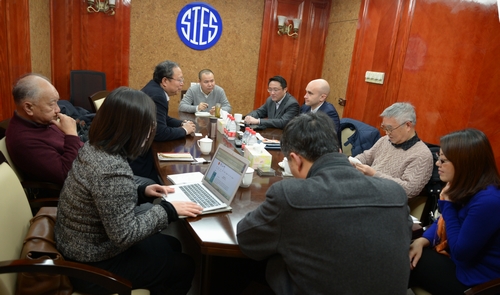On December 28th, Mr. Wojciech Kusak, the second secretary from the Politics Department of the Polish Embassy in Beijing, visited the Shanghai Institute for European Studies (SIES) and exchanged ideas with Shanghai scholars of European studies. The participants of this meeting include: Prof. XU Mingqi, Prof. WU Yikang, Prof. DAI Bingran, Prof. CUI Hongwi, Prof. SONG Lilei, Prof. XIN Hua, SIES Secretary-general CAO Ziheng, Ms. YE Yuming, and SIES Deputy Secretary-general YANG Haifeng.
Mr. Wojciech Kusak told Shanghai scholars that the Polish Embassy in Beijing is the first Embassy that appointed a staff member who is specially in charge of the affairs related to the “16+1” affairs. He emphasized that Poland is an important partner of China.
Mr. Wojciech Kusak pointed out that the whole Central and Eastern Europe (CEE) can be divided into three sub-regions: 1) The V4 Group. It consists of relatively advanced economies that enjoy some kind of comparative advantages in technology and quality of labor force. 2) The Balkan countries in the Southeast Europe. These countries were seriously damaged by past wars in 1990s, so they have a need of more investment on infrastructure. 3) The Baltic countries. They hope to connect the European continental lines of logistics with the northern navigation lines, so as to bring into full play their advantages that they enjoy as navigational and transportation hubs. Some people in the West Europe who views the “16+1” mechanism as an arrangement dividing the European Union, but they do not know that, within the framework of “16+1”, some countries that seldom get in touch with each other in the past, such as Baltic countries in the northeast and Balkan countries in southeast, begin to contact each other, which is really a remarkable achievement for European connectivity.
However, the “16+1” mechanism is confronted with two serious challenges: 1) The issues related to the geopolitical or territorial security. The Central and Eastern Europe is the eastern borderland of the European Union. Some of them are EU member states, but some are not. So they have different concerns and considerations. For example, the Montenegro is concerned with the southward orientation of the EU, while Poland cares more about Russia’s policy towards the East Europe. 2) On the governmental level, politicians and officials have done a lot for the progress of “16+1”, but it may not be easy for businessmen to participate into this mechanism. The Polish businessmen and entrepreneurs may have some misunderstandings on China. Therefore, future efforts should be focused on the people-to-people and business-to-business exchanges, which should play an active role and promote the bilateral political cooperation more effectively.
Mr. Wojciech Kusak made profound discussions and exchanges with the Shanghai scholars on the following issues: the challenges and risks confronting the “16+1” mechanism, the China-Poland relations, and the U.S.-Europe relations after the inauguration of Donald Trump.


